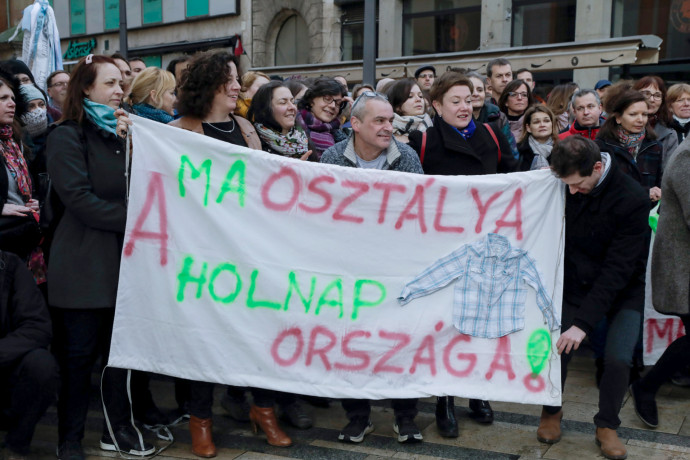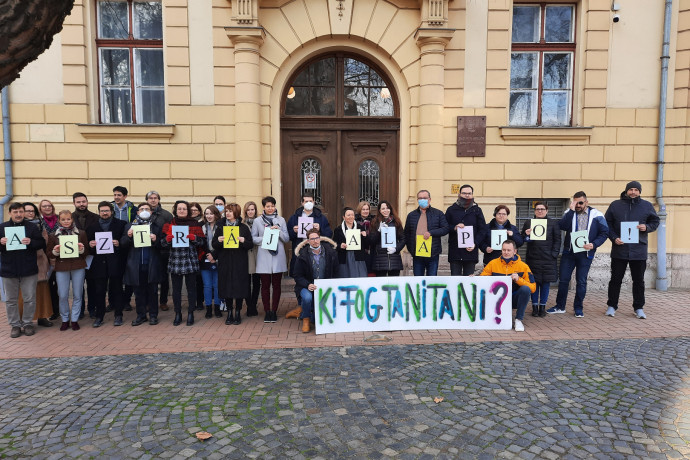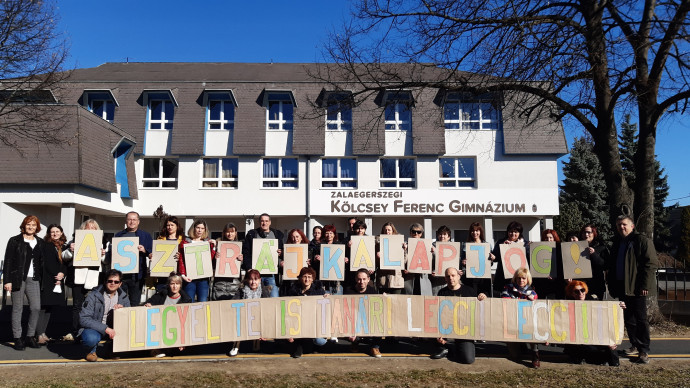What are Hungarian teachers demanding and why are they practising civil disobedience?

Translation by Andrea Horváth Kávai.
What are these events the teachers have been organising every day? Are they striking?
No. This is not a strike, but civil disobedience. Every day, a number of schools across the country express their objection to the situation by not working for a few hours.
What are they objecting about?
They are expressing their objection to the government decree aimed at making their upcoming strike completely ineffective. On January 31st, many schools held a two-hour long, warning strike. After this, the Teachers’ Union announced that there will be an all-day strike throughout the country on March 16th. If you check the calendar, you will see that this is exactly two and a half weeks before the parliamentary elections. The government must have also checked the calendar, because they were swift to issue a decree stating that due to the pandemic, children must be supervised at all times in the classrooms, at least half of all classes must be held, and for students preparing for their matriculation examination, all lessons in subjects they will be tested in must be held.
What does this have to do with the pandemic?
The only reason the government was able to pass such a decree was because of the state of emergency which had been declared due to the pandemic, and which gives the government enhanced powers in decision-making as long as the state of emergency lasts. The government’s official reasoning is that the students’ continued teaching and supervision should be guaranteed at all times, and a strike should not interrupt this. This was also confirmed by the Commissioner for Fundamental Rights.
Why is it important that “adequate services” continue to be provided?
Strikes are regulated by law. In a constitutional state, you can't just refuse to work overnight, because that would turn things upside down in a society. Even when bus drivers and train drivers go on strike, a few lines have to keep running so people can get to work, to school, or to the doctor's. What counts as adequate service is either determined by legislation, or the agreement of the parties involved, or a final decision of the court. In this case a government decree has been adopted against which trade unions have lodged a constitutional complaint, arguing that it unduly restricts their right to strike.
Why is this considered the limiting of the right to strike?
According to the two Teachers’ Unions, if they were to abide by this, that would render the strike completely pointless. The point of workers going on strike is precisely to show that things cannot function without them. When railway workers, public servants or airline employees go on strike abroad, life comes to a partial halt. This way society finds out that something is not right, and the government is forced to act. If Hungarian educators were to comply with the regulation, not much would change, and their strike would be barely noticeable.
What does civil disobedience mean?
Civil disobedience may be used when there is no other means of expressing dissatisfaction with an unjust and unfair regulation or practice of a public authority, which infringes on fundamental rights of citizens. In such cases people consciously break a rule – in this case, the teachers choose not to teach a few of their lessons. Another important point is that such a protest must always be non-violent and morally motivated, and should be done in the public eye.

Why is it called „civil”?
Because this is a tool of the citizen who thinks for themselves. This means that the individual has thought it through, they know what they are doing, and are aware of the consequences.
What sort of punishment could the teachers receive if they take part in such an event?
That is up to their employers, the heads of each school district. For now, we haven’t heard of any retaliations.
How many schools have taken part in this so far?
So far we we know of more than 100 schools in which a part of the teachers have organised some sort of protest. In some schools they stopped teaching for the whole day, while others only cancelled a few lessons. The teachers created signs which read: „Striking is a fundamental right” and published photos of their protest on Facebook. In the beginning, mostly Budapest schools were organising such protests, but recently more and more schools outside of the capital have also been joining. In the first two weeks, a total of 117 schools organised a protest.
How many schools are there in Hungary total?
According to data from 2020, there are 3601 elementary schools and 2243 secondary schools.
In that case 117 schools is not too much. It cannot really be considered a country-wide movement then, can it?
While we cannot say that most of the schools are practising civil disobedience, it also cannot be said that everyone thinks it is okay for the government to quickly issue a regulation in order to attempt to make the teachers’ upcoming strike of no effect. In many cases, even the faculty of the protesting schools is divided: most often it is not the entire faculty which practices civil disobedience, but only a portion of the teachers chooses not to work. In fact, in one instance, there was only one teacher protesting in her school. In a number of schools, many teachers continued teaching, but expressed support for their colleagues’ actions in writing. There are schools where part of the faculty does not agree with the protest or its method and timing, and some agree with the government that it is a political move timed right before the elections. It is also highly likely that many teachers are afraid to express their opinions for fear of retaliations.
Why do teachers want to go on strike?
Both Teachers’ Unions are demanding a raise higher than the 10 percent which the government gave them as of January 1st. They would also like to ensure a raise for the non-educator staff working at schools. The teachers would like to lower the number of mandatory lessons to be taught to 22. They also don’t agree with sending educators who are not willing to get vaccinated to unpaid leave – effective as of January 1st. Both unions have been in talks with the government about these issues for years now, but without success.
How much money do teachers make?
There are no fresh statistics, but according to the Central Bureau of Statistics (KSH), in 2020, an elementary school teacher younger than 30 years received a net salary of 170 000 forints (463 euros), a secondary school teacher in their fourties made a net amount of 240 000. (654 euros) And only those above the age of 50 took home a net amount of 300 000 forints (818 euros) per month. This is not a high salary at all, considering the responsibility teachers are shouldering, and how much time they spend at the school, as well as preparing for their lessons at home. At the same time, all parents expect their children to be taught by well-rested, motivated, prepared educators, who are satisfied with their living conditions.
Why aren’t the unions satisfied with the 10 percent raise that was given to teachers in January?
Because Hungarian teachers’ salaries are still determined based on the minimum wage from 2014 (which was 101 500 forints or roughly 276 Euros). Thus, their wage does not follow the growth of the minimum wage, which has been increased quite significantly recently. The government has only raised the salary supplements, while the Unions would like the wage base to be raised – but this was not approved even after multiple rounds of talks. Both Unions would like the educators’ salaries to be raised by a further 45% – on top of the 10% increase offered by the government in January.

Why are the Unions protesting the mandatory vaccination of teachers?
This has been resolved by now, as the government has announced the relaxing of the epidemiological restrictions, and as part of this measure, as of 7 March, unvaccinated teachers will be allowed to teach. The Unions' opinion is that the problem with this has been that the government's measures so far have not provided sufficient protection for those working in schools anyways, and they were not adequate for containing the epidemic. They claim that the few unvaccinated teachers would not have been the ones posing a serious threat in an elementary school attended by many unvaccinated children. They demanded that teachers who have a valid document proving that they have recently recovered from Covid also be allowed to teach. According to them, if these teachers were to be prohibited from working, it would have just added to the already existing labour shortage and would have placed further burdens on their remaining colleagues.
Why was the teachers' January 31st warning strike unlawful?
There are strict regulations in place about how a strike shoud be organised. For example, there should be an agreement about the provision of continued adequate service – in this case about the care of children. Since an agreement with the Ministry of Education could not be reached, the two Unions asked the court to determine what is considered adequate service in this case. The Ministry most likely tried to prevent the strike at all costs, so in reply they lodged a counter-application. They also requested that the court declare the whole strike unlawful, as – in their opinion – a strike during an epidemic is not legal. The first decision was made by the Metropolitan Court of Budapest on Friday, January 28th, when it ruled that the strike is lawful and it even determined what is considered adequate service. However, this decision had not yet become final 3 days later, when the two Unions held the strike. The decision of the Budapest Regional Court of Appeal came 10 years after this. According to this ruling, the strike was indeed unlawful, but only because there was no final ruling on what is considered adequate service. The court did not accept the government's other arguments, including the one that striking is not allowed during a pandemic.
How many teachers are there total, and how many took part in this warning strike?
There are a total of 115 000 teachers in Hungary, and about 20 000 took part in the warning strike. This is approximately 17%.
What about all the others?
In many places, the Teachers' Union does not have representation, which makes it difficult to mobilize everyone. Most likely, there are also those who did not agree with the strike, as well as some who simply don't want to deal with all of this.
What is the government saying about the teachers' demands?
The government's primary approach is that both the warning strike and the bigger one planned for March are political statements of the left, specifically planned for right before the parliamentary elections (to be held on 3 April). The government often refers to the fact that they started the raises in 2010 with the teachers, when the so-called "career-model" was introduced, but now it's the turn of the health workers, nurses, doctors and social workers. The government claims that they are aware of the problems teachers are facing, and that they are ready to negotiate, but everyone must respect the law. According to the official statement, the debate is about the timing of further teacher pay rises. Last December, Viktor Orbán said that it will be possible to implement further adjustments to the teachers' wages in 2023, but it seems that the Unions do not trust this.